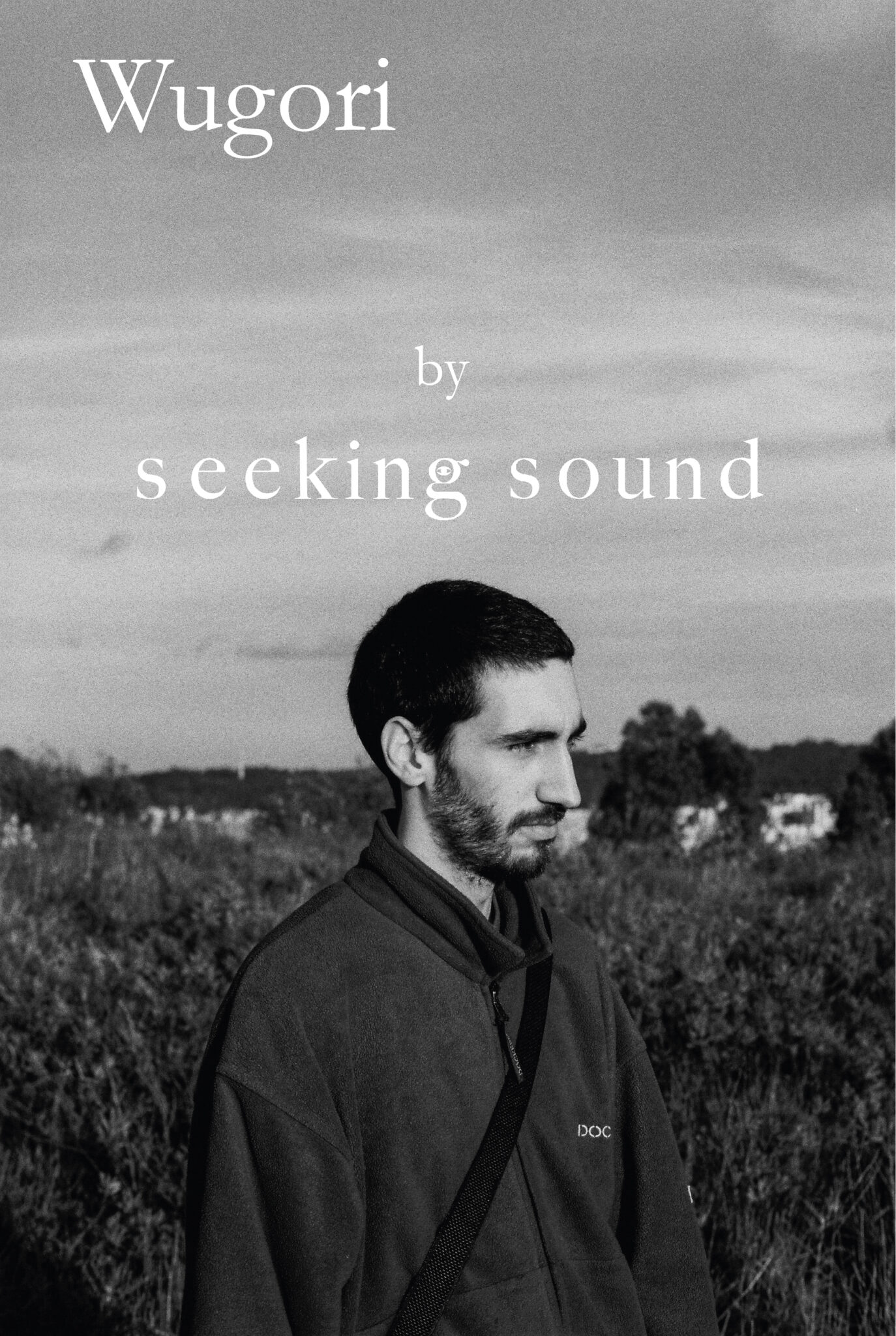“Art must start from a very personal conversation that the artist must have with himself. And that inner conversation isolates us from the world. ”
Published on the 3rd of June, 2023
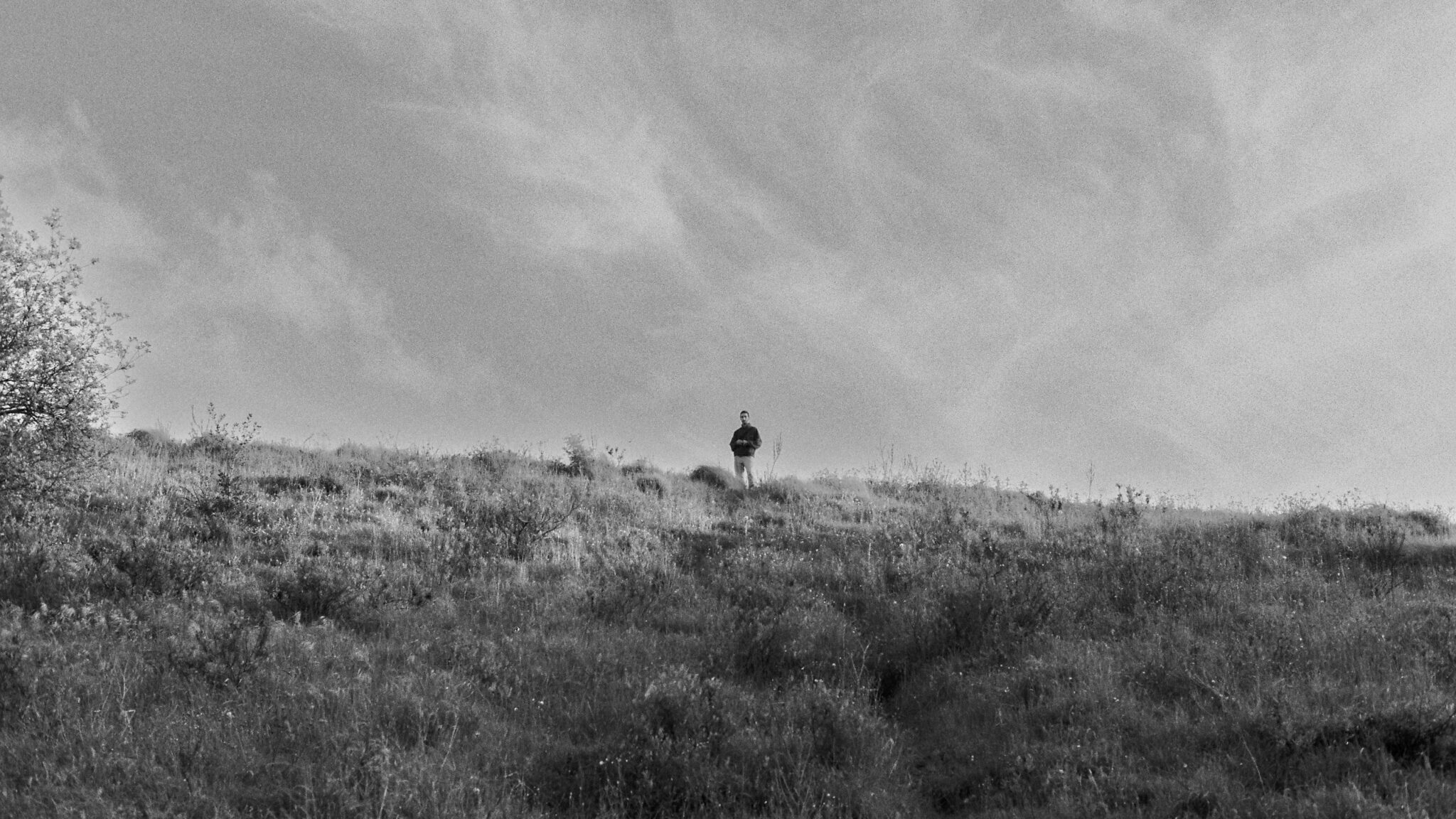
Nuno Rodrigues is a multifaceted artist. He is best known as Wugori, although he can also be recognized as Juice Manuva. Wugori is introspective, solitary, and sincere and flows over instrumentals full of feeling and emotion. Juice Manuva on the other hand is an energetic, boastful, and outgoing persona that rhymes over trap instrumentals. Nuno exudes creativity and everything he puts out is done with the utmost care. Today we present you Wugori.
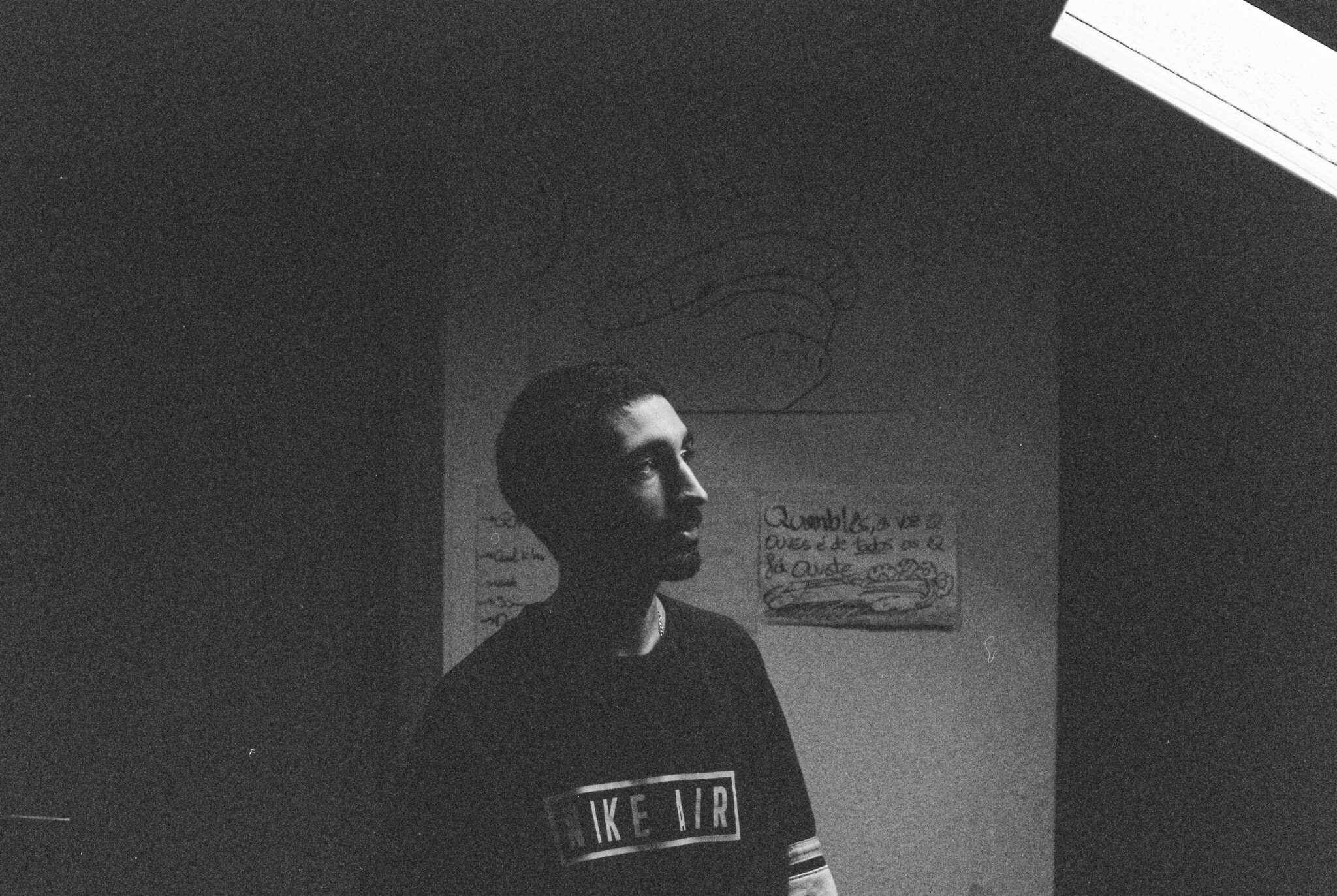
At the end of March, we interviewed Nuno. We met in his studio, a small attic where peace reigns, whose walls are filled to the brim with drawings and paintings made by him. For an hour we chatted about life, talked about past, present, and future, and learned a little more about Wugori. We hope you enjoy reading this interview.
We recommend you have Wugori’s Spotify open by your side while reading the interview so that you can listen to any of the songs mentioned if wanted.
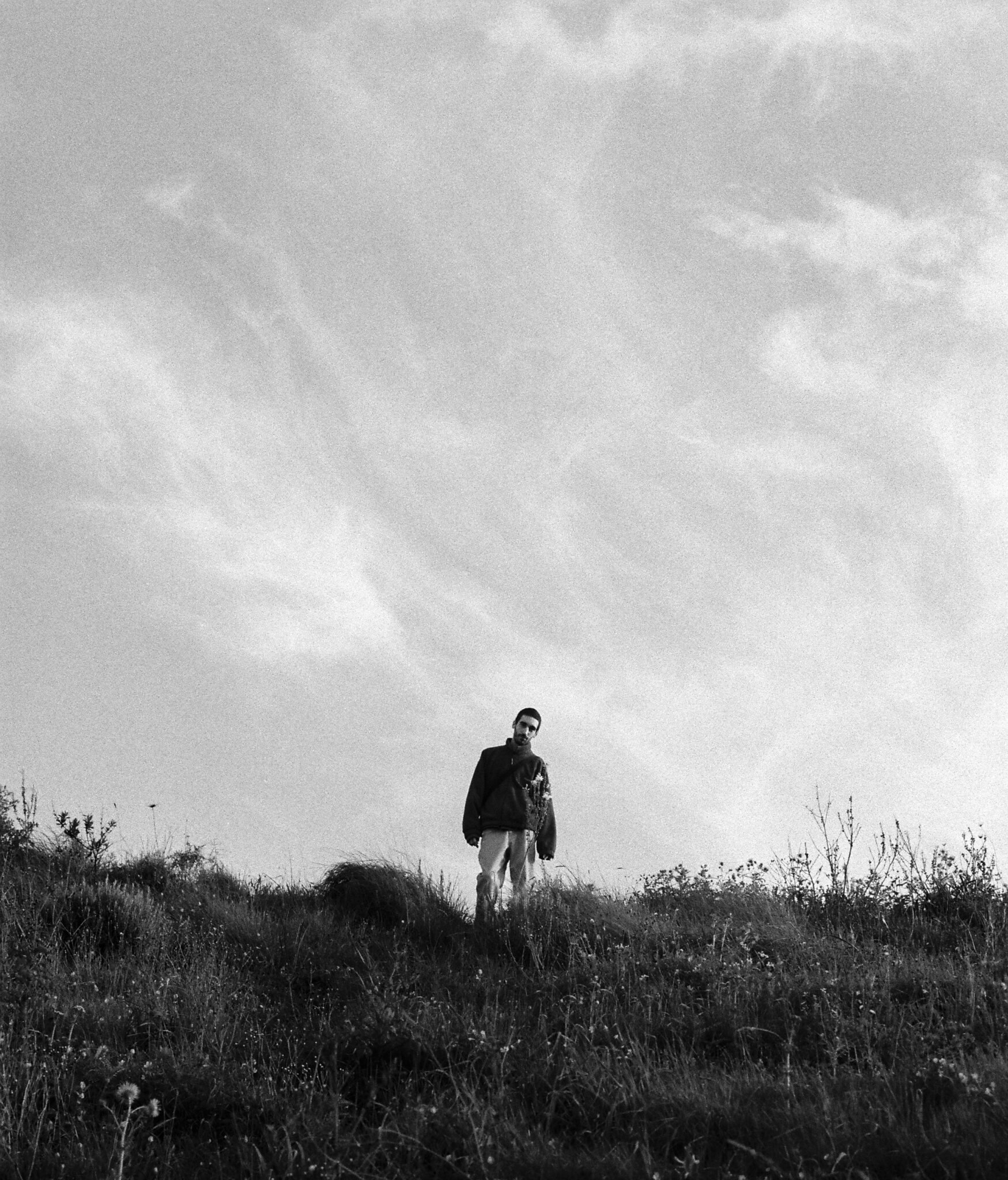
Hello Nuno, tell me a little bit about your childhood.
My childhood was very important to me. Things that happened when I was a kid shaped the way I work and am. I went through my parents’ divorce, and lost friends that were very important to me, who kept leaving and coming back into my life. From an early age, I had to deal with loss and had to learn how to restructure myself.
All this, forced me to define myself, to understand who I was and what I was doing here. Over the last few years, I have undergone several transformations that have resulted in me starting to use my art as a way to heal myself and also to help others.
How did music come into your life?
I listened to a lot of music when I was younger. I remember listening to music on my parents’ stereo and playing with the volume knobs. When I was about 11 years old, I saw for the first time a computer with Virtual DJ open and I was completely amazed by it. I asked my parents to get me Virtual DJ on the computer and started playing with it. Sometime later I started looking for software to make music and that’s where my journey began.
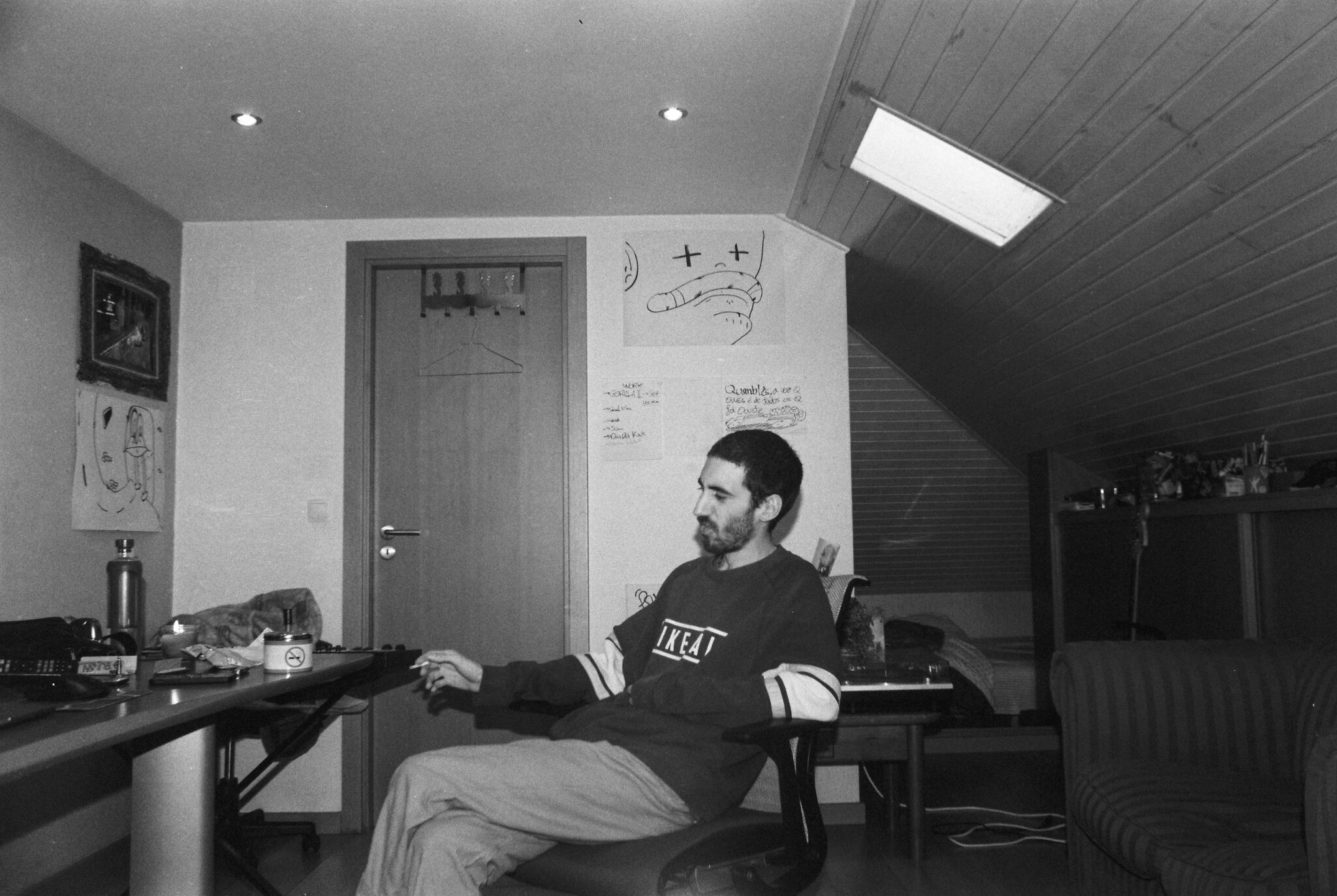

You started messing around with music programs at the age of 12/13, but it wasn’t until you were 18/19 that you started releasing music as Wugori. At first, were you reticent about sharing your art?
For a long time, I had the idea that being an artist or making music was at a much higher level than the one I was at. I was just learning, and I had to establish myself somehow. Initially, I started by producing house and electronica. It wasn’t until later that I was introduced by a cousin of mine to J Dilla, Madlib, and Hip Hop in general. At that moment I thought: “I need to learn how to get this soul into my music”.
At that time, I started trying to produce Hip-Hop and doing some experiments that I would show my friends. Wu was one of those experiments. I worked a lot with friends of mine that wanted to rhyme. I would make beats and come here with them to record with computer microphones that weren’t worth anything.
It was only later in college that I released the beat tape GURILA. It was my first project where I thought I had achieved a sound that deserved to be shared with the world. I wasn’t very hopeful, but I was more comfortable showing my art, and owning my artistic work.
You studied Design at university, right?
I took a music course before I studied Design. I went to ESMEL for a Sound Engineering course where I learned a lot about production, but it also had subjects on acoustics, which involved heavy math. I was more interested in the creative part of creating music than in understanding the electronics and acoustics of music. So, I ended up dropping out of the course.
At that time, I was undecided between going to ETIC to take a production course or following a more creative direction. I thought it wasn’t worth going to ETIC because I had already learned a lot in my course at ESMEL, so I ventured into Communication Design at Lusófona, which was an area I didn’t know, but decided to follow to feed my creative side.
What would you say was the most important thing you got out of the Design course?
This course gave me a lot of hope. Throughout my years in high school and junior high, I always had a desire to do creative stuff, never having taken that direction. Going into design was me saying to myself: “You can do this. You can also be associated with art, and you can develop cute projects”. That way I ended up being passionate about illustration and much more comfortable in exhibiting my work.
The course helped me to understand what an artist or a designer does. The fear I have of not being able to do things was eliminated with that learning, getting to know other designers, other teachers, and their work. That gave me huge freedom to paint pictures and make drawings. As an artist, I no longer have that fear of coming from scratch and this being just a hobby. I’m already more comfortable in showing my work to the world.

I read that your writing comes from you, from sincerity, from your experiences, traumas, and feelings. But where do your production and beat-making come from?
My production has two components. The technical and the emotional.
I feel like a chameleon sometimes. The important thing is to get inspired by something. Trying to understand the technique as much as possible and keep that knowledge to use in the future. My production comes from trying to challenge myself to learn and master techniques that I don’t know, which allows me to explore other musical genres, and that could be an asset in the future. It comes a lot from consuming artists, and art.
When I start making a melody, I know it’s finished when it’s giving me the emotion I want. That’s usually how I know whether things are working or not. If it’s giving me emotion, great. If not, it’s because there’s still a little space for something to be added or something must be removed. This conversation I have with music, in terms of feeling, and what a melody makes me feel or not is very natural for me.
In 2019 you released your first EP Ciclo Das Duas Cobras. A few years after the release of this record I would like to know how you feel about a certain verse and why you wrote it in the first place: “Time goes by but Tico is not starving anymore”.
It’s about Tico. For me, the relationship with animals and nature is something super important. Besides relationships with people, family, and friends, the way we often treat animals says a lot about who we are and how we behave. This verse is meant to pay tribute to the importance of nature and animals in our lives. Tico was a chinchilla that I loved very much and who also kept me company. Love is given to us in the most varied forms, and we must know how to value it. Animals never judge us. Whatever it is, it is a love that is so different, which touches us in such different places in a way that it is necessary to talk about it, write about it, and mark it in time. It’s love and gratitude that I keep in my songs so that I never forget it.
Chinfrim Discos edited your first EP. What did you take away from that experience?
It’s an incredible feeling. As independent as I want to be, someone coming up to you and saying: “We have a label, and we think you’re an artist that deserves a place in our house” is a huge validation. And it’s a giant warmth in the heart. It was Dragão Incógnito, a friend of mine from school, who first called me to play live and that’s how I met the people from Chinfrim. When art is sincere and touches other people, they show support and affection. It is one of the best things there can be in the world.
Chinfrim accompanied the whole process of the EP from the beginning, they always supported me and organized several concerts. The fact that they came to me and accepted to embrace a project that didn’t exist yet was very important for me to feel comfortable with my art and to assume my space as an artist.
Mal Passado Bem Pensado – Wugori.
In 2021 you release your second EP Mal Passado Bem Pensado. You had such a bad time making this record that you can say with 100% certainty it was well thought out?
That’s very good (Nuno laughs). There is this thing with Nuno of having to look for pain inside of me and for things that I don’t see so that my lyrics and the music I make are sincere and touch others. So, there is this notion of having to work hard so that I can later give merit to my work.
With this project, I think Nuno was more grown up when it came to accepting difficulties and dealing with pain. Nowadays, I try to get away from the concept of having to feel bad for my songs to make sense to me.
In this project, you limited yourself to writing, while gonsalocomc took care of the production. You have already said that this was good because this way you could focus on the writing process, which was something you had never done before. Before, you were always balancing production and writing, but you have already said that this could be a bit chaotic sometimes. Why was that?
It’s very difficult to do everything by yourself. It becomes difficult because of the inner judgment about what I’m doing. It’s very easy to stop a creative process, start judging my work, and get blocked in production. I’m too much of a perfectionist in that sense.
Since Gonçalo produced the beats, I let the instrumentals tell me what they wanted. In that sense, it’s a much greater liberation, because I’m only concerned with what the beat is making me feel and where it’s taking me emotionally so I can tell the story I want to tell. Gonçalo helped me discover that I could do well on other people’s instrumentals. It’s something very healthy, which I’ve enjoyed doing.
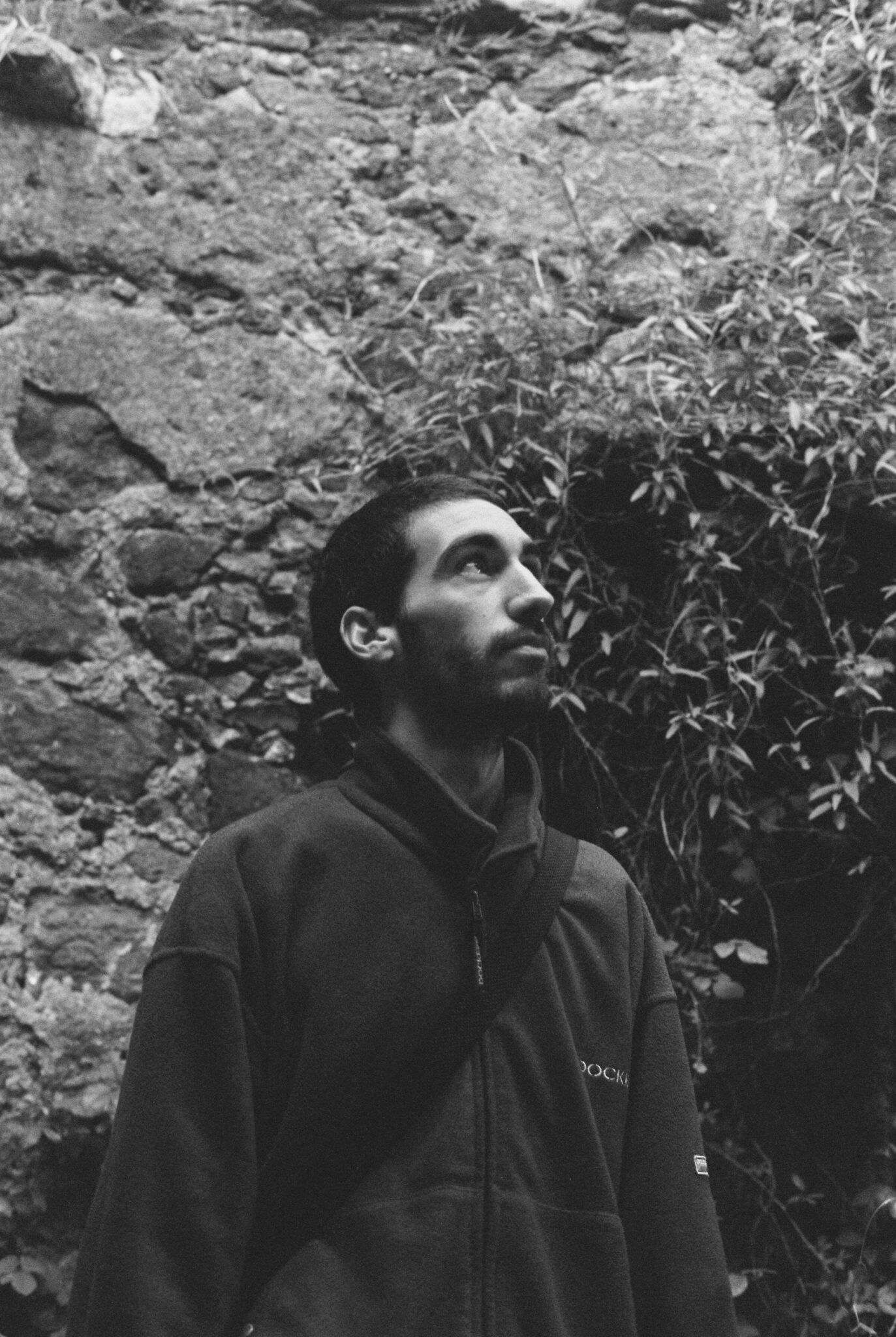
You end the song “Era bom” with a sample of the last interview of the Brazilian writer “Clarice Lispector” before she died, in which she is asked “From which moment, according to the scripture, the human being becomes a sad loner?” to which Clarice answers “That’s a secret. I’m sorry I won’t answer”. Why did you choose this specific sample to start the song “Jerónimo”?
That came from Gonçalo. I’ve asked myself that question several times. I like to ask myself what the purpose of the artist is and from which moment on the artist gets lost and isolates himself in what he does. I identified very much with that sample.
Art must start from a very personal conversation that the artist must have with himself. And that inner conversation isolates us from the world. No matter how much I expose myself in my music, it doesn’t mean that people actually see what I see. And that isolates us a bit. That’s what I take away from that sentence. But I can’t tell you the purpose of that sample because it was not me who put it there.
In the song “Jerónimo” you sing “Loneliness makes me a kid”. Doesn’t it make you feel grown up?
Life has lots of things that are two sides of the same coin. Loneliness ends up being a bit like that. When we are down, we feel like a child, alone and helpless, and when we are well with ourselves, loneliness makes us feel that we can do anything, that we can overcome everything, and that we have nothing to lose.
In this song, the loneliness, the suffering, makes me feel like a child because it’s the trauma coming back, it’s the child with pain that I feel inside when I go down. It’s the one who has suffered, who needs love, who sometimes can’t accept it. And this is a bit of me assuming my story to everyone, that side of me, and realizing that I can fall into this, live this, and that it’s normal for this to happen.
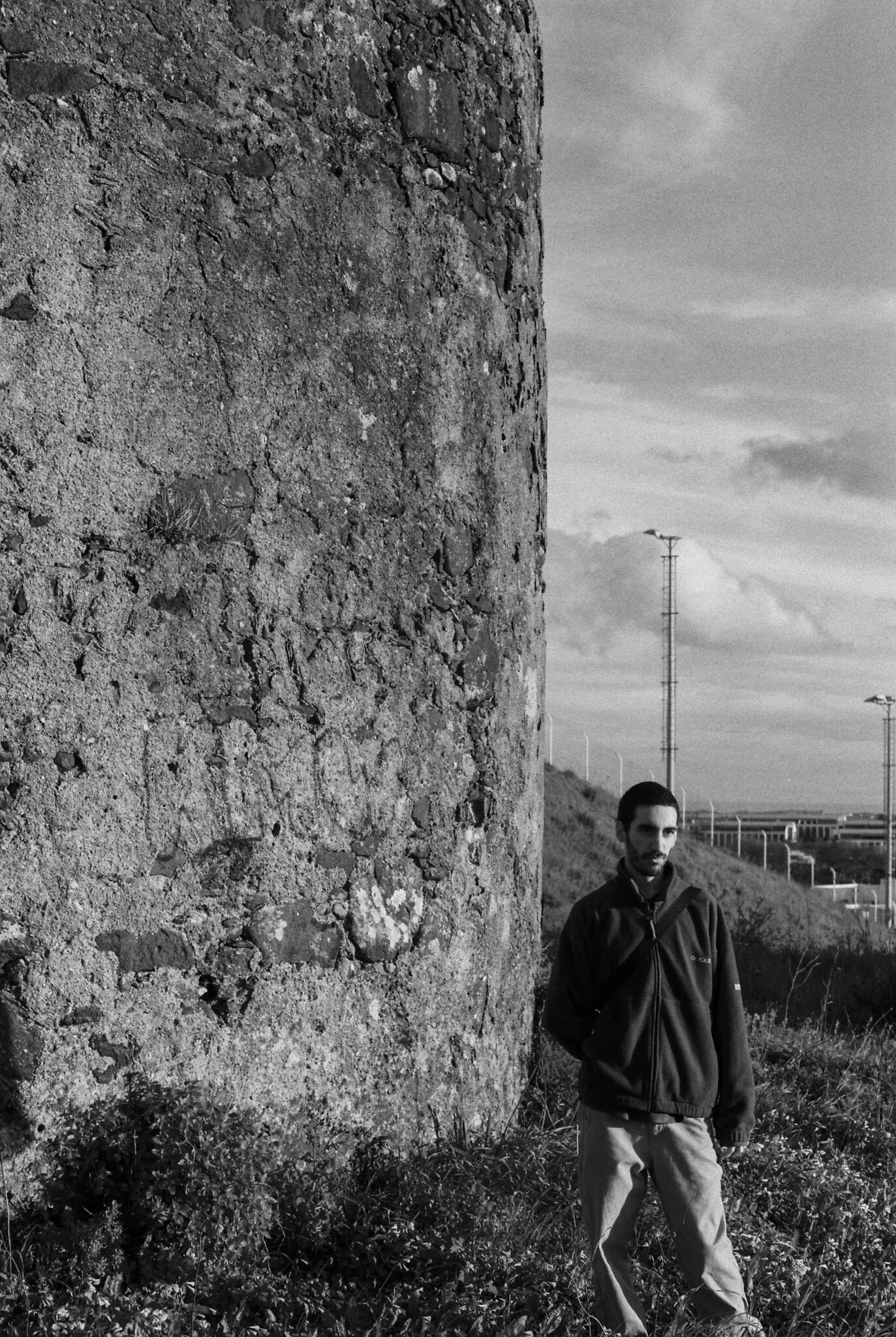
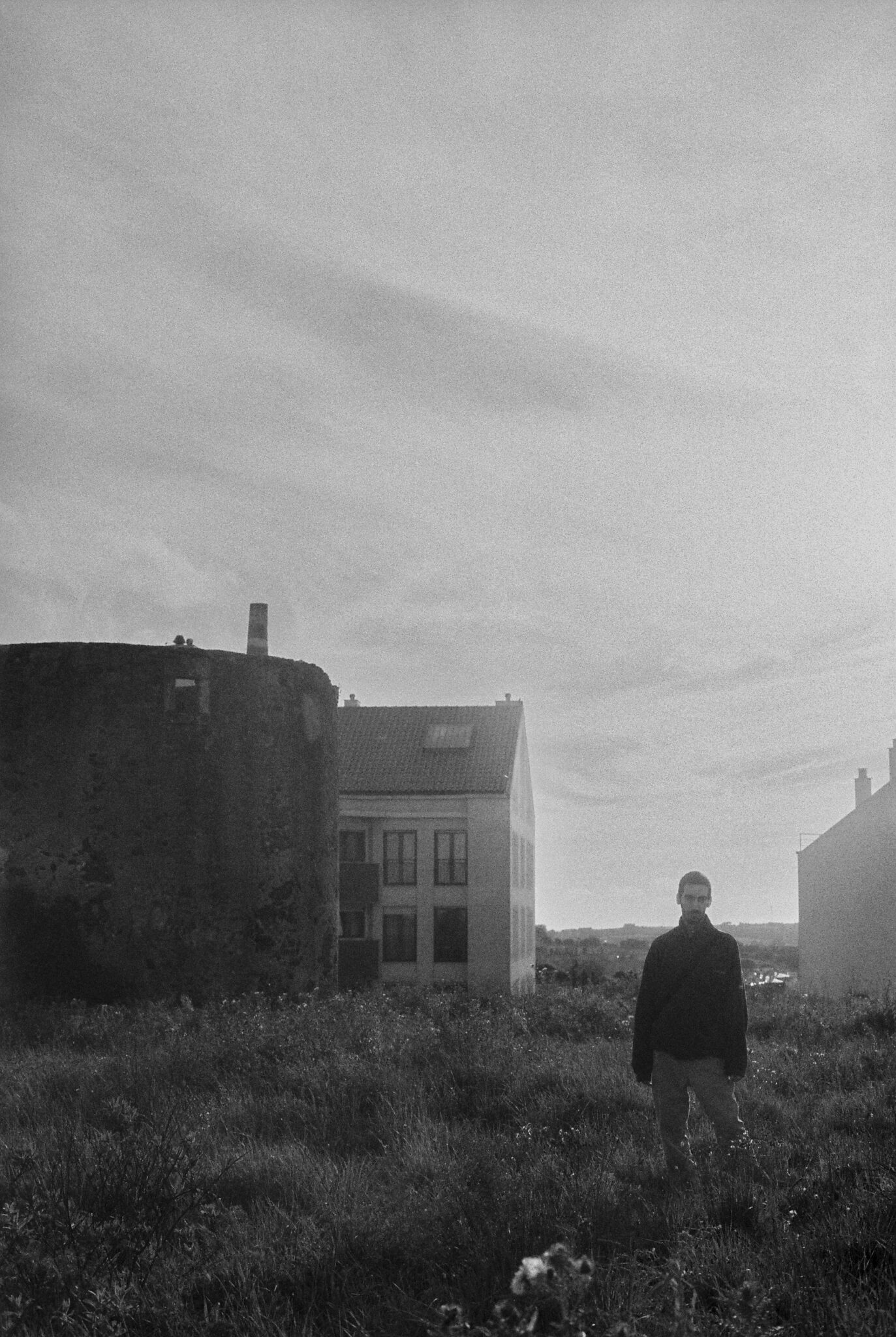
On your Instagram, there are dozens of references to the fictional character Sonic. Why is this toy so important to you?
Sonic was my first passion for something that doesn’t exist. It was allowing myself to fall in love with a character from a reality that wasn’t mine and would never exist in the same place as me. To love the space he lived in and to live within that world.
Sonic represents believing in that magic and not being afraid to fall in love with abstract things, that are neither real nor practical and that have no solid root. That object that everyone knows will never exist because it is a toy and a character. But I value this love of the imaginary and the magical, which often helps people deal with things.
Besides producing for yourself you have also produced for other artists, such as Mura and Subsolo. How would you compare the process of producing for other artists as opposed to producing for yourself?
When I am producing for other artists, I feel at home. In that sense, I can have a conversation, I can explain to people what would probably sound better or not, and I can develop a product. It’s much cooler. I would love to take a band, put everyone in their place, and find talents within each member because I really enjoy reading people, and their talents and finding out how they express themselves musically. When I’m producing someone, I kind of know what to expect. So, it feels like I’m painting a picture and people are colors that I manipulate to get to the final painting.
When I’m producing for myself, it’s like I have a blank canvas in front of me that I can paint in so many ways and colors that I get lost. Then the situation gets a bit complicated.

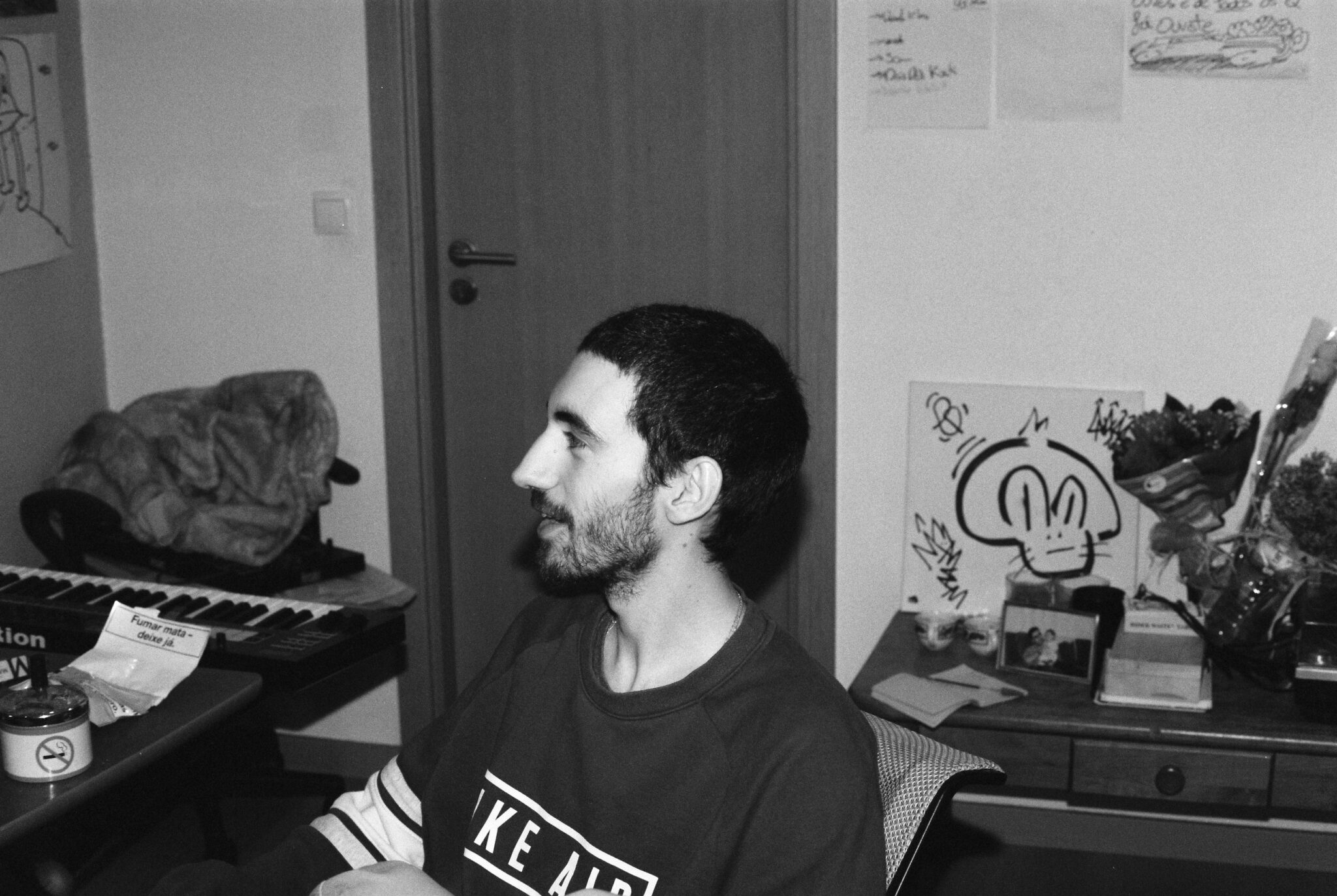
How do you consume culture?
That’s one of those things I shouldn’t talk about because I’m one of the worst people at consuming culture. I’m very critical. I wish there was room for people to stretch what they already are and are defined by. I want to see more experimentation. I got a little tired of listening to hip-hop myself. So now I’m trying to listen and explore different genres.
Juice Manuva is Nuno’s more mischievous, childish alter ego. With that alter ego you also explore other musical genres such as Trap that you don’t always explore with Wugori. What made you feel the need to create Juice Manuva?
Juice Manuva comes to existence because I had to find tools to deal with the exposure that came around when I came out as Wugori and the pressure it put on me regarding the next step. I felt like I was looking at a blank canvas, but I wasn’t feeling free enough, nor was I feeling happy while creating.
Juice Manuva is born in the attic, which is my bedroom and studio, and from the fact that it’s a safe place for both me and my friends. I used my friends, in the sense of us being here together, excited, making music, and trying to show that you can have fun and make art, without being constrained. And it doesn’t need to come from the deepest place inside of us. Juice Manuva comes to celebrate that friendship and that nerdier side of me, that doesn’t think so much about what you’re doing, and tries to have fun during the process and live in the moment.

“Trata” – Wugori.

You recently participated in the song “Tontura” from xtinto’s new album Latência. You also displayed a picture painted by you at the exhibition held at the album launch party. How important is the act of painting to you?
The act of painting is amazing to me because if I’m constantly analyzing and judging my work in music, when it comes to art and painting, I don’t mind at all being the biggest kid and the worst painter in the world. Because I do it to free myself from everything I have in here. It’s a huge freedom to make a line and that line telling me what will come next. To leave something in the world without even thinking about what it is or giving it a name.
You’ve been announcing the release of “the album” for a few years now. The album you’ve already told me about. Why has it become such a time-consuming process?
I have a lot of music made, I spend all year producing and I have hundreds of demos that get left behind on the computer.
I think I’m putting a huge amount of pressure on myself to make the album as perfect as possible. I feel like I have a lot of genres in my hand, and what’s taking the longest for me is piecing together the puzzle of how I’m going to put a project together having so many possibilities on the table. I’m scared of the commitment involved in taking on a certain project as my first album.
And of course, there’s always the super important component of me feeling satisfied with what I’ve done. If I’m going to do another project, it has to be well done. I’m not going to rush anything. Everything takes its time.
